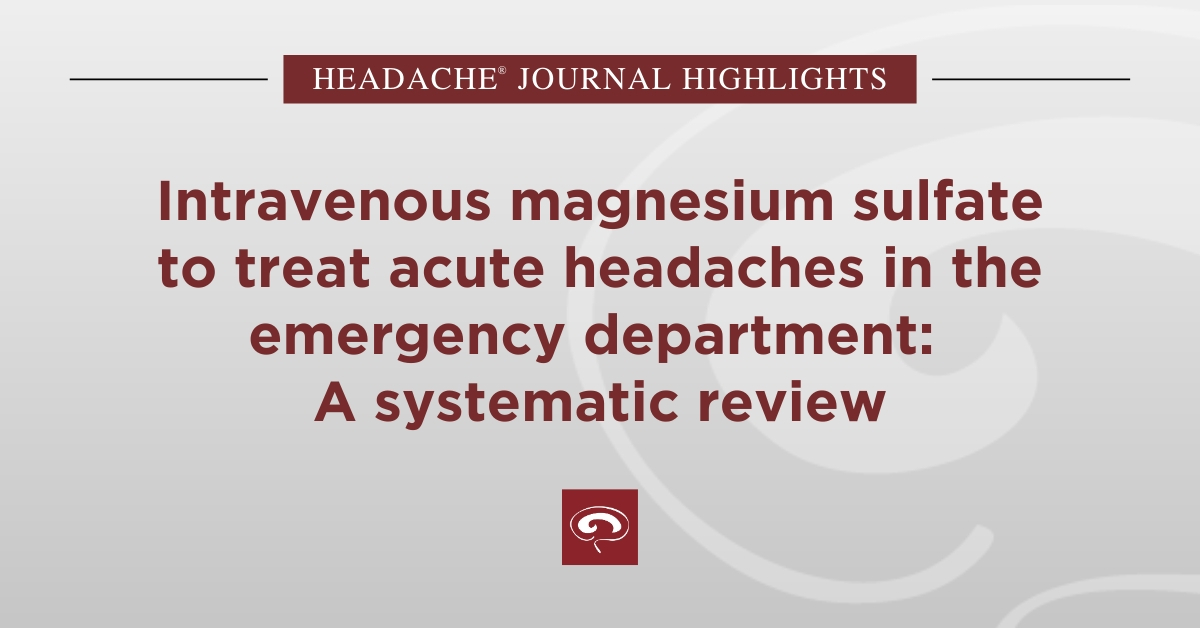
Magnesium Sulfate for Acute Headache Treatment
Deena Kuruvilla, MD, evaluates a recent Headache® article and discusses the use of nutraceuticals in headache medicine
A systematic review recently published in the journal Headache® is important in demonstrating what kind of natural approaches can be used to treat headaches, such as magnesium sulfate for acute headache treatment, compared with prescription medications, according to Deena Kuruvilla, MD.
Andrew Miller, MD, of the East Carolina University Brody School of Medicine and colleagues gathered existing studies on the use of intravenous magnesium sulfate for treating acute headaches in the emergency department. They sought to determine if patients experienced better pain control, a lower rate of recurrence at 24 hours, lower requirements for rescue analgesia, and less adverse medication effects when treated with intravenous magnesium sulfate, compared with other treatments and placebo.
Dr. Kuruvilla, who commented on this paper for the American Headache Society, says that people involved in headache medicine may be familiar with the literature that is covered in the paper. But she notes that the article nicely summarized the results, and it specifically explained how each clinical trial differed and how the drug could be used more effectively.
“It’s nice to see that somebody really took the time to review this and show the evidence so that providers can do some of those more-natural approaches, which research shows that many patients prefer,” she says.
Review of Randomized Clinical Trials
Dr. Miller and colleagues searched scholarly databases, relevant bibliographies, clinical trial registries and relevant conference proceedings. Researchers looked for randomized clinical trials of patients aged 18 years or older, who had non-traumatic headache and were treated in the emergency department or an outpatient acute care treatment center with intravenous magnesium sulfate. The treatment was compared with placebo, corticosteroids, dopamine antagonists, ergot alkaloids, non-steroidal anti-inflammatory drugs, triptans, or usual care.
Results of Magnesium Sulfate in Trials
Of 4,018 identified references, researchers found that 7 randomized clinical trials studying 545 participants met inclusion criteria. They found that pain intensity was improved with magnesium sulfate v.s. comparators at 60-120 minutes, but no earlier. Results for the endpoint of pain reduction by 50% were conflicting—three studies reported that headache was improved, unchanged, and less with magnesium sulfate.
In one study, complete pain relief was found to be improved with magnesium sulfate, as well as in the migraine with aura (MA) subgroup in another. The need for rescue analgesia at any point was also found to be improved with magnesium sulfate in one study, as well as in the MA subgroup in another. In one study, 24-hour headache recurrence was improved with magnesium sulfate, but unchanged in a second. A planned meta-analysis was not conducted by Miller and colleagues due to the clinical heterogeneity among studies.
Conclusions
Researchers concluded that existing evidence suggests there are potential benefits in pain control beyond 1 hour, aura duration, and need for rescue analgesia for intravenous magnesium sulfate use in the treatment of acute non-traumatic headaches. They noted, however, that they were unable to draw a firm conclusion on the treatment’s efficacy or benefit.
Analysis of Magnesium Sulfate for Headache Treatment
Kuruvilla highlights that, despite the positive outcome, there’s still research that has to be done on intravenous magnesium sulfate for acute headache treatment. She notes that a larger, randomized control trial would be helpful since the largest group noted in the review was 120 patients.
“I think that if they had a larger sample size and they included patients who experience migraine for longer than 72 hours, that could be something for future research to tackle,” she says.
Kuruvilla also notes that the review’s importance is related not only to the results, but to changing the general perception of nutraceuticals.
“Nutraceuticals are sometimes underappreciated compared to a lot of the mainstream prescription treatments,” she says. “I think there’s such an opportunity for more research into nutraceuticals—specifically vitamins—for the treatment of migraine and other headache disorders. I think that we need more opportunities to get that research funded.”
The American Headache Society prides itself on being a source for all of the latest research in headache medicine. To stay up-to-date on the most recent advancements, visit our News page.


